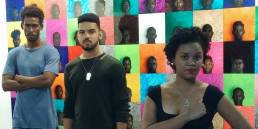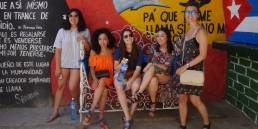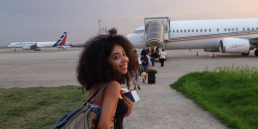Before we talk about what you’ll be doing at FIU, for those who aren’t familiar with your background: You have been hailed as an example of the American Dream and an immigrant success story. Can you tell us a little bit about your first couple of years when you arrived in the United States? What were some of the challenges that you and your family faced and how did you overcome them?
Thank you for the kind words. My family settled in South Florida as I was about to start high school. Although we were very motivated by the opportunities now available to us in the United States, our period as recent arrivals also entailed significant hardships, including economic scarcity, language barriers and the separation from our family in Cuba. Eventually, with the support of our relatives, friends, and the community at large, we were able to overcome the many obstacles and accomplish our individual and collective goals. My mother and father found stable employment in their respective professional fields, and my sister and I won scholarships to attend universities that opened many doors for us. We thus harbor enormous gratitude towards our South Florida community, and a strong commitment to help others achieve their own dreams.

Within a span of four years, you went from La Habana to Miami to Harvard. That’s quite a ride!
That period of my life was both the most challenging and the most thrilling. I experienced so many difficulties, but I also underwent tremendous personal growth and saw my family reap the rewards of our sacrifice. When I moved to Cambridge, Massachusetts to start my studies at Harvard, I realized that the snowy East Coast could not have been more different from my tropical upbringing.
I took great pride in representing and sharing my culture with others when I arrived at Harvard, where I encountered an extraordinary group of Cuban students who were always available to play dominoes, dance salsa, make the pilgrimage to a Cuban restaurant in Boston and even roast a pork in caja china at tailgates before the famous Harvard-Yale football games.
For the children of exiles, Cuba is often a collection of nostalgic stories from our parents and grandparents. What does Cuba mean to you? What will it mean to your daughter?
While growing up in Havana, I was not fully conscious of the meaning or expressions of my Cuban identity. My love for salsa dancing and very sweet café con leche; my way of speaking loudly and fast, with my mouth, hands and arms; the energy, warmth and frequency of family gatherings; my excitement and my passion for life…These were, in my mind, largely elements of my individual and family identity.
When I moved to the United States as an adolescent, I immediately befriended other Cuban students at school, and we would get together during lunch breaks and school field trips to sing Cuban songs or dance ruedas de casino. Slowly, I began to recognize all that was Cuban in me, especially as my interactions with people from other cultures became more prominent, when I left Miami to start college in Massachusetts. Soon I had become aware that my family traditions, my way of relating with others, my tastes for food and music, the way I spoke Spanish, were very much a product of my rich Cuban heritage, including my Spanish and Chinese ancestry.
After my daughter was born, almost two years ago, in the United States, I have grown even more conscious of the complexity of the Cuban identity, and the ways in which the particular identity of immigrants and their offspring is shaped. My husband and I are anxious to discover what Cuba will mean to our daughter. We speak to her in Spanish, and sing Cuban lullabies to her. We live in the same building as my parents, who shower my daughter with the affection so typical of Cuban abuelos. The first meal she ever had was puré de malanga. And whenever I teasingly ask her if she´s from Havana, she always smiles and raises her arms, thinking I’m about to break into Camila Cabello´s popular song, to which she loves dancing.
Intergenerational misconceptions happen in all communities and this is certainly the case in ours. What do you wish older exiles understood better about recien llegados and millennials in Cuba? Conversely, what do you wish recien llegados and millennials on the island understood a little better about the exilio historico?
Empathy will be essential to foster mutual understanding across Cuban generations and immigrant waves. I wish that our community, that all Cubans, fully embraced the fact that the things that unite us are so much greater than our differences. That regardless of our date of birth or departure, our place of arrival, or whether we left or stayed, we are bound by a rich national history, by strong family values, by our ingenuity and resilience, and our common love of the arts, sports and Cuban traditions. Most important, I think that our community should be united, and uplifted, by the unavoidable truth that we all want the best for the Cuban people. And to achieve this common goal, we must have greater disposition to learn from one another in the spirit of finding common ground, truly appreciating the value of our individual and collective experiences and accomplishments. These are the meaningful interactions that CasaCuba will seek to facilitate.
What are some of the ways that young Cuban Americans can support the aspirations of our peers on the island? What can we learn from one another?

There is special magic in connecting with someone who shares our background, our roots. When we help others with whom we can identify at a deep cultural and personal level, we are not only sharing information or tangible resources; we are also inspiring. And inspiration is what triggers a greater emotional exchange, a deeper bond between the people, and the belief that one is capable of achieving much more. I am a strong advocate for the value of genuine and proactive mentorship relations especially between people in similar academic and professional fields. Creating or sharing development opportunities, opening doors, and cultivating talent are powerful ways to yield sustainable benefits. It would be wonderful if more of these relationships flourished across young Cubans regardless of their present location.
I know you just started your new role, but let’s pretend it’s 2023 and you’ve now been at FIU for five years. Looking back, what would you like to say were your greatest achievements? Any exciting projects on the horizon?
Five years from now, CasaCuba will be a vision made reality. We will have built an iconic, 50,000-square-foot facility on FIU´s main campus, hailed as a dynamic and innovative meeting place featuring a vibrant calendar of conferences, seminars, artistic performances, workshops, networking events and celebrations anchored in popular Cuban traditions, and open to all South Florida residents and visitors.

In order to fulfill this vision, the support of the community will be essential. I will be hosting regular community conversations to gather the best ideas to build CasaCuba as a common second “home” that is truly representative of our richness, diversity and collective goals. I also hope to begin forging collaborative relationships, and exciting projects, with other educational institutions, museums, historical societies, cultural centers and professional organizations dedicated to the exploration and preservation of Cuban history and culture. In order to launch operations and build the CasaCuba facility as soon as possible, we will also need to raise funds. The generosity of individuals and institutions alike who believe in the potential of CasaCuba´s mission will enable us to become the premier cultural and intellectual hub for Cubans, and everyone with an interest in Cuba.
What are your favorite Cuba spots in Miami or the places that instantly transport you to Cuba?
There are so many! More than just Cuban spots, Miami offers the greatest collection of “Cuban experiences” outside of Cuba. I can’t count the places where I can enjoy good batido de mamey, ropa vieja, cortaditos, croquetas…Or live Cuban music and performances. I love that our distinctly Cuban accent, in both Spanish and English, is omnipresent in conversations around town. But nothing feels more Cuban than my family gatherings, or parties with friends, when we all talk at the same time and break into ruedas, or when my Cuban-Chinese great aunt shares natural remedies, and I am reminded that Cuba is with me anywhere I go, as long as I am surrounded by the warmth of Cubans and all our wonderful traditions.
Finally, you’re a successful woman…who also happens to be an immigrant, a Harvard graduate, an author, a mother, a wife, a sister, and a daughter. Some people say it’s impossible to do all of those things well. What have been the keys to your success? And what message do you have for young Cuban Americans and Latinos with big dreams?
I am fortunate that my family instilled in me a strong belief in my capacity to achieve even the most ambitious dreams. My parents always made it clear that education and hard work were the right path to follow, and from a very early age I was convinced that my success, however I defined it, would be commensurate with my discipline, dedication, perseverance and focus. I always felt like everyone around me, and especially my grandmother, expected a lot from me. My grandmother would question even a 99 on an exam. She would constantly remind me that I did not have to be the best, but I had to be better. That I didn’t necessarily have to win, but I had to compete. Therefore, I learned to demand a lot of myself, and to be humble.
Crucially, I think, my family always provided an environment of love, happiness and protection at home, so that I felt safeguarded through all my endeavors. This support network was essential to achieve every goal in my life and to keep my academic and professional careers in perspective, always striving for balance with my own personal fulfillment.
As I raise my daughter, it is my hope that I will be able to convince her that every dream is within reach if she is willing to put in her best effort. That is the message I have sought to share with the many students I have mentored over the years, especially fellow Cubans. As long as we foster our knowledge and intellectual curiosity, as we realize and maximize our potential, and build strong support networks, there is nothing that we cannot achieve.
GIancarlo Sopo
Giancarlo Sopo is a communications strategist who has advised multinational corporations, professional services firms, leaders, and non-profit organizations in the United States and Latin America. He co-founded CubaOne in 2016.



